Imposter Syndrome at Medical School.
You don’t have to dig very far into the depths of the internet or social media to uncover one of the most common issues facing medical students. Imposter Syndrome.
“Impostor syndrome can be defined as a collection of feelings of inadequacy that persist despite evident success. ‘Impostors’ suffer from chronic self-doubt and a sense of intellectual fraudulence that overrides any feelings of success or external proof of their competence.” – Gill Corkindale, 2008, Harvard Review
Up to a quarter of male medical students and up to half of female medical students show signs of imposter syndrome. Imposter syndrome has been shown to correlate with increased burnout, emotional fatigue and cynicism.
What does imposter syndrome feel like?
Imposter syndrome is the feeling that you don’t belong where you are, despite having earned your place. In medical school it is very common for students to feel somehow less than, or unequal to, those around them. This is despite them all having jumped through the same hoops to get there.
Being at medical school creates the perfect environment for imposter syndrome to thrive.
Medical school is a very competitive environment. Students are continually pitched against each other. Final grades are awarded by your place in the year, and graduates are ranked against all medical students graduating nationally.
Everyone knows that getting into medicine is a competitive process.
A-level grades, personal statements and interviews… Medical applicants are told that only the best of the best will be selected. Receiving an offer to study medicine from any of the four medical schools you can apply for each year is a confirmation that you are amongst this small, selected few.
However, for many students, starting medical school is a shock to the system.
Medical students, typically, have come from sixth-forms and colleges where they were top of the class. Each class can only have so many people at the top though. 90% of medical students are going to move from being in the top 10% of their cohorts, to not. There can only be so many at the top. Going from being told that you are special or gifted for being in this small percentage of high performers to being surrounded by 400 other top ‘1%ers’ is a rude awakening for many 18 year olds.
Suddenly you go from good grades, minimal effort and everything making sense to feeling like you’re falling behind your peers.
Other medical students rarely help.
In medical school, especially in London’s top universities, there is an unspoken expectation that you achieve high grades, have a social life, don’t work particularly hard and manage to somehow be involved in extracurricular activities.
This is untrue.
This is also very unfair and damaging to young medical students.
The charade is kept alive by students seeing their seniors and peers performing well in exams while hiding how much effort they are putting in. I have to admit; I have been guilty of this.
The Cure?
Imposter Syndrome cannot just be cured by some external intervention. The cure is easier said than done. To ‘get over’ imposter syndrome, a student must either realise that they are just as smart, hardworking, worthy and dedicated as their peers; or realise that the image they hold in their heads of a perfect medical student is a lie.
I am someone who is guilty of perpetuating the ‘perfect medical student’ image by trying to be always productive and smiling. If, from my social media, you’ve gotten the impression that I am always on top of things, I have to apologise! I can promise I am not!
Ways I have found to limit feeling like an imposter:
- Don’t be ashamed to ask for help, you will realise that many of your peers won’t know the answer to a question either.
- Offer to help peers with something they are struggling to understand. You will boost your confidence by taking on a teaching role, and they will likely reciprocate by helping you.
- Remember how hard you had to try to get where you are. YOu really beat the odds to even be studying medicine.
- Remember that there are no First, Second or Third class doctors. You and your ‘perfect medical student’ peers will graduate with exactly the same qualifications and competencies.
If you do find yourself struggling at medical school then please do get in contact with the support team at your university. It is something many many medical students suffer with, and there is no need to suffer in silence.
Don’t forget you can always get in touch with me through the contact page!

-
-
3 years
-
Tagged Medical School, Medical student